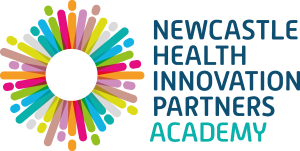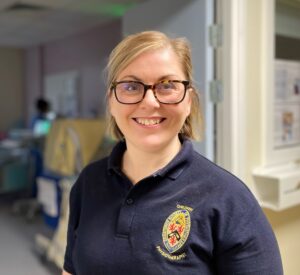She is currently undertaking a PhD – a National Institute of Health Research (NIHR) Clinical Doctoral Fellowship – focusing on ‘Improving neonatal follow-up for preterm infants and their families.’
In this blog Claire tells us all about her work and how she juggles her clinical role with her passion for clinical academic research.
Hello, my name is Claire Marcroft. I am Clinical Academic Neonatal Physiotherapist at the Newcastle Hospitals and there are three different aspects to my current role
Clinical
I work in a busy Neonatal Intensive Care Unit at the RVI’s Newcastle Neonatal Service. In the in-patient setting, I work with babies who are premature or unwell requiring medical intervention. My role also includes out-patient multi-disciplinary clinical reviews, regular multi-disciplinary team meetings and local and regional teaching.
I also enjoy and value the importance of collaborative working with parents. I am passionate about developing the culture of Family Integrated Care within neonatal services, and in particular supporting families to feel close and connected with their baby and confident to care for them.
Academic
Throughout my clinical career I have recognised the importance of research, leadership, and service improvement in improving clinical care. Academically, I hold a National Institute of Health Research (NIHR) Clinical Doctoral Fellowship – which enables registered health and social care professionals to obtain a PhD by research whilst concurrently developing their professional skills – and I am currently undertaking a PhD.
My research is titled ‘Improving neonatal follow-up for preterm infants and their families’ and includes qualitative, co-design and implementation science methods.
Newcastle Health Innovation Partners Academy
Claire’s PhD is also supported by the NHIP Academy, on behalf of Newcastle upon Tyne Hospitals NHS Foundation Trust and Newcastle University.

NHIP Academy is part of Newcastle Health Innovation Partners (NHIP) and is a new collaborative venture that aims to unlock career development opportunities for the next generation of health and care researchers, including those within the NMAHP community.
The Academy supports individuals looking to establish, progress or navigate research careers – from internships to professorial awards.
Strategic
I am also the Lead Physiotherapist for the Northern Neonatal Network. This is a strategic role and I work with the other Allied Health Professional and Psychology Lead Clinicians to contribute to workforce planning (specifically to increase Allied Health and Psychology provision to babies and families receiving neonatal care in the Northern Neonatal Network), to reduce variation in care between neonatal units and to develop educational resources for families and other clinicians.
My three roles are all complementary to each other which is exciting and busy.
So what’s my PhD all about?

My PhD research is predominantly qualitative in nature. Qualitative methods aim to explore and understand experiences and complex processes.
To collect this data, I interview parents of babies born very prematurely and healthcare professionals, to critically explore their views and priorities of neonatal follow-up care. I chose this area to explore because I want to identify and develop interventions to improve this experience for families.
The first step is to understand a wide range of different experiences to find what works well, and what could have been done differently, and better, for families who have experienced a wide variety of different services. I am collecting data from three different service providers in the Northern and Yorkshire Neonatal Networks.
I am also currently writing up data from a national survey, which I developed and distributed in collaboration with the British Association of Neonatal Neurodevelopmental Follow-up (BANNFU) and the Neonatal Operational Delivery Network Lead Physiotherapists. The data will give us a better understanding of the variation within neonatal follow-up services Nationally.
I’m very passionate about working in partnership with people with lived experience of neonatal care. Parents are experts by experience. Clinicians working in partnership together with parents (and patients) is the best way to develop and improve neonatal services.
I feel privileged that people want to share their experiences with me and I’m enjoying learning about and using qualitative research methods.
What have I discovered so far?
I work and study part-time and am 3 years into my 5-year PhD. I’m learning about and using a research methodology called Grounded Theory, and one aspect of this methodology means I analyse the interview data as I go along the process.
So far, it’s clear that there are challenges for families during transitions between different healthcare service providers, and families have reported varying positive and negative experiences of health visiting service providers.
In addition, parents would like more information to help them navigate services after discharge home and greater understanding of how preterm birth may affect their child in the longer term (such as when they start school).
In the next two years, I will complete the interviews and data analysis and work with parents and healthcare professionals (in focus groups) to understand what specific interventions might be and how these could be developed in the future.
A research journey full of mentorship and collaborative support
I enjoy learning new skills, especially those outside of the more ‘traditional’ skills required for my physiotherapy profession. I’ve also found it vital to develop connections and collaborations with other Clinical Academic AHPs and have found their support and understanding vital for personal and professional growth.
The Doctoral Support Group run by Newcastle’s NMAHP research community has been an invaluable source of support over the last couple of years. When I was first developing my PhD application a few years ago, this group was not established and there was no clear point of contact for support but the development of the NMAHP research team and the publication of the NMAHP Research Strategy has changed this.
I enjoy contributing to this by participating in the delivery of the 4Ps research development programme, my role in this involves facilitating the ‘Person’ module either online or in-person. It’s a great opportunity to meet NMAHPS from different professions and hear about their clinical academic research interests and experience and support them to develop themselves further to improve patient care.
I’ve also had to learn that things may not always go according to plan, and will be messy, but you will learn the most during these times. Understanding ‘who’ you need around you is an important part of the process.
Harnessing national support
Nationally, there has recently been a big drive to increase and improve neonatal AHP and Psychology workforce services. Neonatal AHPs have many shared role objectives focussed on promoting and enhancing psychological, nutritional and developmental outcomes for babies and their families. Early intervention is a vital aspect of neonatal care and there is increasing recognition that the first few years of a child’s life is a critical time to support them and their families.
Having the opportunity to work with colleagues on a national level, has enabled me to develop wider networks and use some of my newly developed skills in different ways. I have recently had the opportunity to contribute to the development of the Health Education England online neonatal learning modules, contribute to a National Neonatal Research Priority Setting Partnership workstream and collaborate with the British Association of Neonatal Neurodevelopmental Follow-up (BANNFU) specialist interest group.
More locally, Tiny Lives Charity (Newcastle based charity supporting families of babies requiring neonatal care) has paid for a physiotherapy post on the neonatal unit for many years now. They have also financially supported service improvement initiatives led by our Neonatal Physiotherapy Team.
Most recently they funded a collaboration with Healthcare Designers from Northumbria University, and families with lived experience of neonatal care to develop resources to support families.
Embarking on this project using a co-design approach, invited us (as a project team and, more broadly for clinicians working on the neonatal unit) to develop resources for families with families. Families have reported that this process has enabled them to feel more visible, acknowledged and heard.
Families felt that the underlying messaging of posters and communication cards was that ‘their baby belonged to them’ to feel close to their baby, and more confident in caring for their baby, both on the neonatal unit and after discharge home.
The poster ‘family is a feeling, not a place’ was highly important to families. They told us that it set a positive message when entering the neonatal unit, and a wider tone that their baby belonged to them.
The future is bright!
I enjoy combining clinical, academic and leadership roles. In the future, I’d like to be able to design and develop the interventions that will be identified in the latter part of my PhD and go on to deliver these interventions and test their impact.
I’m also keen to use my qualitative research skills in other areas of neonatal care, and I have lots of ideas of projects that could be undertaken to help us understand more about how parents and families experience their care.
Firstly though, I need to finish the PhD and do a good job of it!
Ultimately, I would like to have the chance to be a Consultant Clinical Academic Neonatal Physiotherapist and to support others to develop their own research ideas and skills. I think the Newcastle Hospitals is the right organisation to help me to achieve this ambition.
Expert supervision
Professor Catherine Exley, Dean of Population Health Sciences Institute and Professor of Qualitative Health Research at Newcastle University is Claire’s supervisor. She said: “I am delighted to have been part of Claire’s PhD journey.
“From the outset, she has been clear about her commitment to developing a clinical academic career equally balanced between research and clinical practice and leadership. I was delighted when Claire was awarded funding for her PhD through the highly competitive NIHR scheme.
“It is a pleasure to be part of Claire’s supervision team: she is always full of energy and enthusiasm and skilfully manages competing demands on her time. I am sure she will be a great clinical academic leader of the future.”
Colleague Nick Embleton, Professor of Neonatal Medicine at Newcastle Hospitals and Newcastle University added:
“Claire has shown amazing ambition and determination to plan and undertake her PhD and is an excellent role model for all AHPs considering an academic career.
“Her research findings will change the way we organise neonatal follow up, both locally and nationally.”
#MakeSpace4Research
Find out more about what support is available for you if you are a nurse, midwife or allied health professional on our webzone:
Contact us
Email [email protected]
The HEE/NIHR Clinical Doctoral Research Fellowship (CDRF) Scheme
The CDRF Scheme supports graduate (post-degree) health and social care professionals (excluding doctors and dentists) who have at least one year’s experience in professional practice, and who can propose to undertake their doctorate at a recognised Higher Education Institution (HEI) based in England at an NHS body based in England or at any other English provider of publicly or third sector funded health and/or social care services (for example, a commissioned social enterprise, local authority or hospice).
A CDRF supports the award holder to develop their research skills and their professional skills in parallel; the latter through dedicated time for professional practice and/or through other activities that support development as a practitioner.
The CDRF Scheme differs, therefore, from the separate NIHR Doctoral Fellowship Scheme, which is open to anyone wishing to develop health and/or social care research skills and does not support or place emphasis on professional development.
